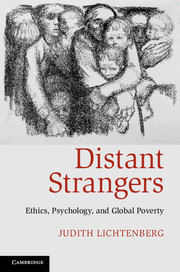Book contents
- Frontmatter
- Dedication
- Contents
- Preface
- Chapter 1 Introduction
- Chapter 2 Entanglements and the claims of mere humanity
- Chapter 3 Duties and rights, charity and justice
- Chapter 4 “Negative” and “positive” duties
- Chapter 5 Oughts and cans
- Chapter 6 Why people do what others do – and why that’s not so bad
- Chapter 7 Whose poor?/who’s poor?: deprivation within and across borders
- Chapter 8 Hopefully helping: the perils of giving
- Chapter 9 On motives and morality
- Chapter 10 Conclusion: morality for mere mortals
- Works cited
- Index
- References
Chapter 2 - Entanglements and the claims of mere humanity
Published online by Cambridge University Press: 05 June 2014
- Frontmatter
- Dedication
- Contents
- Preface
- Chapter 1 Introduction
- Chapter 2 Entanglements and the claims of mere humanity
- Chapter 3 Duties and rights, charity and justice
- Chapter 4 “Negative” and “positive” duties
- Chapter 5 Oughts and cans
- Chapter 6 Why people do what others do – and why that’s not so bad
- Chapter 7 Whose poor?/who’s poor?: deprivation within and across borders
- Chapter 8 Hopefully helping: the perils of giving
- Chapter 9 On motives and morality
- Chapter 10 Conclusion: morality for mere mortals
- Works cited
- Index
- References
Summary
In this chapter I explain and assess the different kinds of moral reasons one might have for thinking that people ought to act to mitigate the conditions of global poverty.
Nonrelational reasons: need and ability
Broadly speaking, we can divide these reasons into two main kinds. The first is simply the existence of suffering on the part of one person alongside the ability to alleviate it on the part of another. When Peter Singer argues that a passerby ought to save a child drowning in a shallow pond when he can do so with no risk and virtually no cost to himself, he implies the principle we can put this way: where there exists need on the part of one person and ability (to satisfy that need) on the part of another, there is some moral reason – call it moral force – to alleviate the need. The slogan “Can Implies Ought” (turning the philosopher’s more familiar one on its head) captures this idea. In general, the degree of moral force depends on the stringency of the need on the one side, and the degree of ability on the other.
- Type
- Chapter
- Information
- Distant StrangersEthics, Psychology, and Global Poverty, pp. 19 - 46Publisher: Cambridge University PressPrint publication year: 2013



